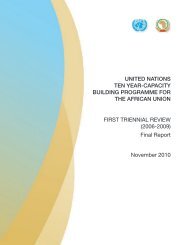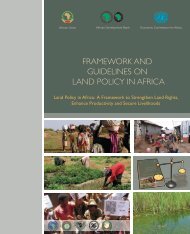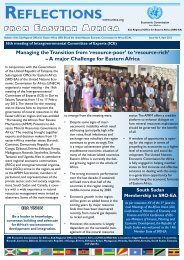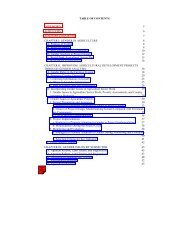A Decade of NEPAD - Economic Commission for Africa - uneca
A Decade of NEPAD - Economic Commission for Africa - uneca
A Decade of NEPAD - Economic Commission for Africa - uneca
You also want an ePaper? Increase the reach of your titles
YUMPU automatically turns print PDFs into web optimized ePapers that Google loves.
20 A <strong>Decade</strong> <strong>of</strong> <strong>NEPAD</strong>: Deepening <strong>Africa</strong>n Private Sector and Civil Society Ownership and Partnership<br />
The Initiative’s work has helped <strong>NEPAD</strong> countries to improve<br />
the investment related content <strong>of</strong> the <strong>Africa</strong>n Peer<br />
Review Mechanism and to enhance their capacities to<br />
implement investment climate re<strong>for</strong>ms in sensitive areas<br />
such as water and transport infrastructure.<br />
The Initiative is guided by a Steering Committee chaired by<br />
the <strong>NEPAD</strong> CEO with Vice-Chairs from South <strong>Africa</strong> and<br />
Japan and composed <strong>of</strong> all major <strong>NEPAD</strong> actors, OECD<br />
countries and donors, RECs, the <strong>NEPAD</strong> Business Group,<br />
the <strong>NEPAD</strong> Business Foundation, the <strong>Africa</strong>n Partnership<br />
Forum, OECD Development Assistance Committee, the<br />
Investment Climate Facility, the World Bank, UNCTAD<br />
and other partner organizations.<br />
The Initiative has served as a facilitator <strong>of</strong> region-wide dialogues<br />
on investment facility and will between 2009-2011<br />
G8 Support<br />
The Group <strong>of</strong> 8 was initially established in 1975 as an annual<br />
meeting <strong>of</strong> the major industrial democracies <strong>of</strong> the<br />
world to discuss relevant economic and political matters<br />
facing their domestic societies and the broader international<br />
community as a whole. The original meeting was<br />
comprised <strong>of</strong> six countries France, Germany, Italy, Japan,<br />
the United Kingdom and the U.S. In 1985, Canada joined<br />
the meeting and in 2006 Russia became a <strong>for</strong>mal member<br />
after serving as an observer state from 1991-1998.<br />
The founders <strong>of</strong> <strong>NEPAD</strong> presented the <strong>Africa</strong> Action Plan<br />
to the G8 countries <strong>for</strong> the first time at the G8 Summit<br />
in Canada in July 2002 developing what became the G8<br />
<strong>Africa</strong> Action Plan.<br />
At the G8 meeting in Evian, France the following year, it<br />
was decided to extend the dialogue between the G8 and<br />
<strong>NEPAD</strong> to all <strong>of</strong> the member countries <strong>of</strong> the OECD that<br />
contribute substantially to development assistance. As a<br />
Bretton Woods Institution Support<br />
In July 1944, following the end <strong>of</strong> World War II, a United<br />
Nations Monetary and Financial Conference was convened<br />
in Bretton Woods, New Hampshire in the U.S. Out <strong>of</strong><br />
this historic gathering <strong>of</strong> 44 nations came the mandate<br />
to establish the International Monetary Fund and the<br />
begin to go further and focus on PFI-based peer reviews in<br />
pilot countries using two OECD tools: the OECD Principles<br />
<strong>for</strong> Private Sector Participation in Infrastructure, as the<br />
basis <strong>for</strong> policy frameworks <strong>for</strong> regional infrastructure<br />
investment, and the OECD Risk Awareness Tool, the basis<br />
<strong>of</strong> multi-stakeholder dialogue on doing business in weak<br />
governance zones.<br />
In addition to the <strong>NEPAD</strong>-OECD <strong>Africa</strong> Investment Initiative,<br />
since 2000 the Development Centre <strong>of</strong> the OECD, in<br />
conjunction with the <strong>Africa</strong>n Development Bank Group<br />
and the <strong>Economic</strong> <strong>Commission</strong> <strong>for</strong> <strong>Africa</strong>, has published<br />
the <strong>Africa</strong>n <strong>Economic</strong> Outlook, an annual detailed analytical<br />
guide on <strong>Africa</strong>’s economies, their economic per<strong>for</strong>mance,<br />
challenges, and opportunities.<br />
result, in November <strong>of</strong> 2003, the <strong>Africa</strong> Partnership Forum<br />
was established. 14<br />
In 2005, at the 31 st G8 Summit held in Gleneagles, Scotland<br />
in the U.K., in support <strong>of</strong> <strong>NEPAD</strong>, the G8 members<br />
pledged to double their current aid commitments by 2010.<br />
In practice this meant that given their current pledges <strong>of</strong><br />
slightly more than US$25 billion, the G8 members pledged<br />
to raise their ODA pledges to roughly $54.5 billion in 2010,<br />
which would translate into an annual increase <strong>of</strong> 17% per<br />
annum between 2007 and 2010. 15 Half <strong>of</strong> this aid was to<br />
be earmarked to support <strong>Africa</strong>’s development.<br />
Through their ODA contributions and their on-going<br />
participation in the <strong>Africa</strong> Partnership Forum, the G8<br />
members have continued to support the implementation<br />
<strong>of</strong> <strong>NEPAD</strong>.<br />
14 www.africapartnership<strong>for</strong>um.org<br />
15 <strong>Africa</strong>n <strong>Economic</strong> Outlook 2009, <strong>Africa</strong>n Development Bank and<br />
OECD, p. 33<br />
International Bank <strong>for</strong> Reconstruction and Development,<br />
or the World Bank.







